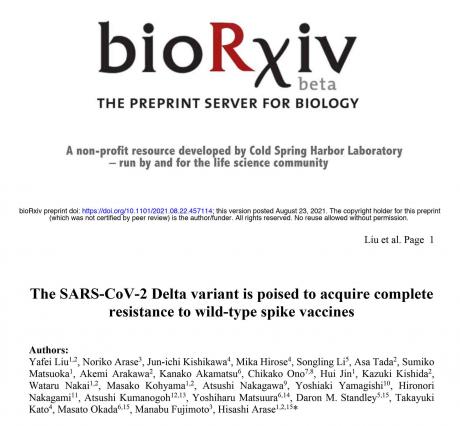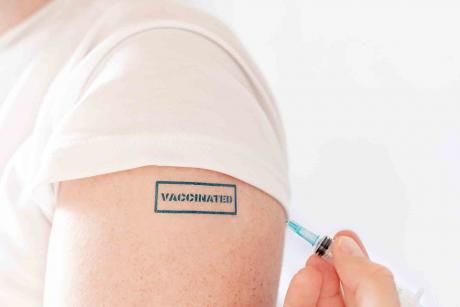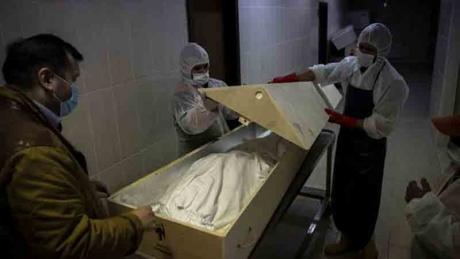Ultra-vaxxed Israel is now the “Covid capital of the world.â€
It is difficult to say definitively what the efficacy of the Pfizer mRNA jab is in Israel, as there have not been any official studies conducted on it yet. However, given the CDC’s findings in America, it is likely that the efficacy of the jab in Israel is also lower than initially thought.
The surge in Covid-19 cases in Israel is a stark reminder that even with a successful vaccine roll-out, the virus can still spread rapidly. Despite being one of the first countries to launch a mass vaccination campaign, Israel has seen its daily case numbers soar to record levels in recent weeks. This has sparked fears that other highly vaccinated countries could be hit by another wave of infections due to waning immunity from the jabs. Health experts have warned that while vaccines are effective at preventing severe illness and death, they may not be as effective at stopping transmission of the virus. As such, it is important for people to continue following public health guidelines such as wearing masks and social distancing even after receiving their vaccinations.
- Israel has become the Covid capital of the world despite leading the charge on vaccines, in a clear warning sign that Britain, the US and other highly-immunised nations are still vulnerable to another wave.
- Stats compiled by Oxford University-backed research team Our World in Data shows there were a record 1,892 Covid cases per million people in Israel on Wednesday — nearly 0.2 per cent of the entire population in a single day.
- That was significantly higher than second worst-hit Mongolia, where the rate was 1,119 per million, and double the figures for Kosovo (980), Georgia (976) and Montenegro (909), which rounded out the top five.
- The figure only looks at one day’s worth of tests and Israel’s high rate is thought to have been driven up by a huge testing push ahead of schools reopening there.
- But the country has consistently reported some of the highest infection rates in the world since mid-August amid an unprecedented third wave, despite being one of the most vaccinated nations in the world.
- For comparison, 522 people per million in the UK tested positive yesterday and the figure was closer to 595 in the US. It suggests protection gained from vaccines is starting to buckle in the face of the highly-transmissible Delta variant.
Solution? Endless boosters!
What could possibly go wrong???
A new study has found that leaky vaccines, which are designed to protect chickens from certain viruses, can actually enhance the spread of deadlier strains of the same virus. The research, published in the journal Science, suggests that current vaccination strategies may need to be re-evaluated in order to prevent the emergence of more dangerous viruses.
The study focused on a type of avian influenza virus known as H5N1. Vaccines for this virus have been used since the 1990s, but they are not always effective at preventing infection. In some cases, vaccinated chickens can still become infected with the virus and pass it on to other birds. This phenomenon is known as “leaky” vaccination.
The researchers studied how leaky vaccines affected the spread of H5N1 in a population of chickens over a period of three years. They found that when leaky vaccines were used, more chickens became infected with deadlier strains of H5N1 than when no vaccine was used at all. The researchers concluded that leaky vaccines can increase the risk of disease outbreaks by allowing deadlier strains to spread more easily among birds.
The findings suggest that current vaccination strategies may need to be re-evaluated in order to prevent the emergence and spread of more dangerous viruses. Vaccine manufacturers should consider developing improved vaccines that are better able to protect against multiple strains of a virus, or using combination vaccines that target multiple viruses at once. Additionally, farmers should ensure that their flocks are regularly monitored for signs of infection and take appropriate steps if any birds show signs of illness.
- Over the past fifty years, Marek’s disease—an illness of fowl—has become fouler. Marek’s is caused by a highly contagious virus, related to those that cause herpes in humans. It spreads through the dust of contaminated chicken coops, and caused both paralysis and cancer. In the 1970s, new vaccines brought the disease the under control. But Marek’s didn’t go gently into that good night. Within ten years, it started evolving into more virulent strains, which now trigger more severe cancers and afflict chickens at earlier ages.
- Andrew Read from Pennsylvania State University thinks that the vaccines were responsible. The Marek’s vaccine is “imperfect†or “leaky.†That is, it protects chickens from developing disease, but doesn’t stop them from becoming infected or from spreading the virus. Inadvertently, this made it easier for the most virulent strains to survive. Such strains would normally kill their hosts so quickly that they’d die out. But in an immunised flock, they can persist because their lethal nature has been neutered. That’s not a problem for vaccinated individuals. But unvaccinated birds are now in serious trouble.
- […] The duo infected vaccinated and unvaccinated chicks with five different strains of Marek’s virus, of varying virulence. They found that when unvaccinated birds are infected with mild strains, they shed plenty of viruses into their surroundings. If they contract the most lethal strains, they die before this can happen, and their infections stop with them. In the vaccinated chicks, this pattern flips. The milder strains are suppressed but the lethal ones, which the birds can now withstand, flood into the environment at a thousand times their usual numbers.
- Read and Nair also found that the “lethal†strains could spread from one vaccinated individual to another, and that unvaccinated chickens were at greatest risk of disease and death if they were housed with vaccinated ones.
Pfizer CEO Albert Bourla believes that the COVID-19 vaccine will need to be administered annually, similar to flu shots. He believes this is due to the fact that the virus is constantly mutating and new variants are emerging. By administering a vaccine every year, it can help keep up with these mutations and ensure that people remain protected from the virus. Additionally, Bourla believes that annual vaccinations could help reduce transmission rates and ultimately lead to herd immunity.
- Pfizer CEO Albert Bourla predicted in a Wednesday interview that people will most likely need annual COVID-19 booster shots, a sign that we’ll be contending with the novel coronavirus for years to come.
- Speaking with Insider by phone, Bourla acknowledged the uncertainty around his guess. But he said he believes regular vaccinations will be needed because of the potential for new variants to emerge and vaccine protection to wane over time.
- “The most likely scenario is we will be needing annual re-vaccination, as we do with the flu vaccine,†Bourla said.
- Pfizer’s COVID-19 vaccine, which was co-developed with the German biotech BioNTech, is on track to be one of the pharmaceutical industry’s best-selling drug of all time in 2021. Pfizer estimates the vaccine will generate $33.5 billion in revenue this year.
- Over the last few months, Pfizer and Bourla have argued that an initial booster shot would likely be needed six to 12 months after initial vaccination.
Is creating a Marek’s disease in humans as a business model the goal?
You may also like


